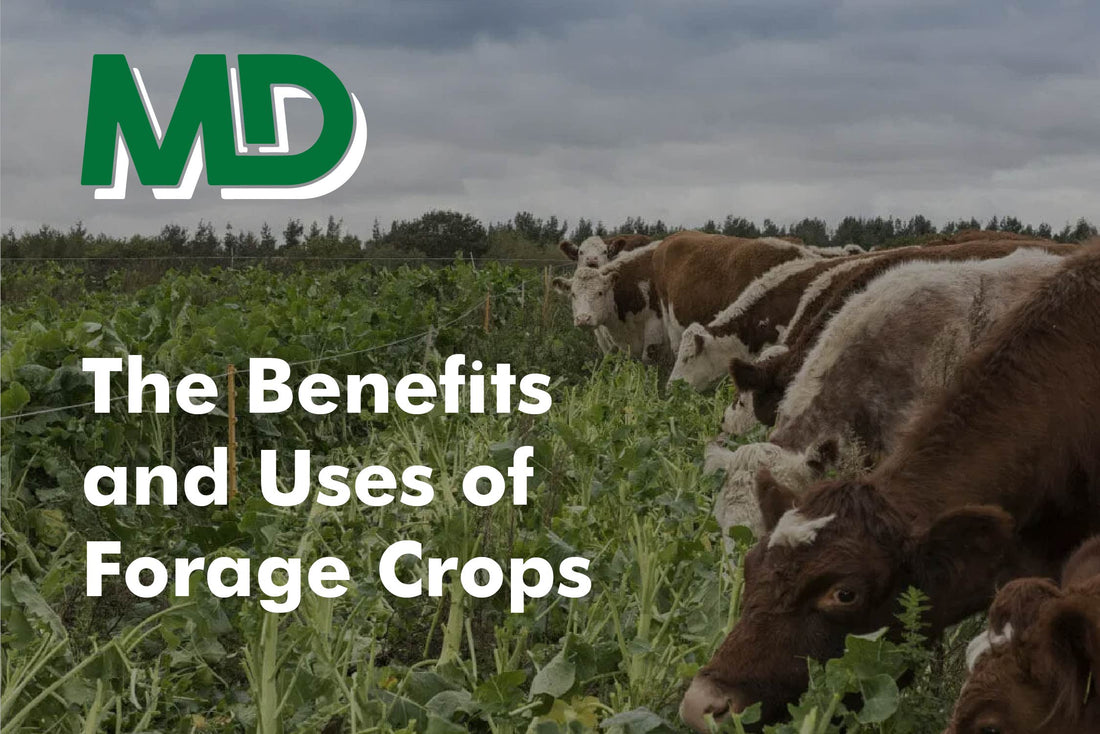
Share
As a farmer, providing adequate nutrition for your livestock while maintaining a healthy farm ecosystem can be a challenge. This is where forage crops come in handy. Forage crops are plants specifically grown to feed livestock, and they are great for adding diversity to your livestock's diet and providing a range of nutritional benefits. In this blog post, we will explore the benefits and uses of forage crops, such as Kale, Stubble Turnip, Forage Rape, Swede, Chicory, Fodderbeet, and Forage Rye.
Forage crops have numerous nutritional benefits that can help keep your livestock healthy and strong. For instance, they contain high levels of vitamins, minerals, and proteins. Forage crops are also an excellent source of energy for your animals, thanks to their high digestibility. They are also more affordable compared to concentrates like grains. This is because they are relatively easy to produce and usually have a better nutrient-to-dollar ratio compared to purchased concentrates.
One forage crop that stands out is Kale. This particular crop is a great source of vitamins C and K, and it is highly palatable for both cattle and sheep. It has a high fibre content, making it ideal for ruminant animals. Additionally, it is easy to grow and can endure harsh climates, making it a great option for farmers who live in areas with extreme temperatures.
Stubble Turnips are another forage crop that farmers can incorporate into their livestock's diet. These crops are fast-growing and easy to establish. They are rich in proteins, minerals, and carbohydrates, making them a perfect source of energy for your livestock. Additionally, they are highly palatable, making them an excellent choice for animals that may struggle to eat other types of forage.
Forage Rape is ideal for late-season grazing due to its cold tolerance, yielding ability and excellent feed quality. It can offer high crude protein and energy that helps farmers maintain animal performance through the colder months. It also provides a great grazing alternative for more intensively managed systems which may reduce the use of high cost, processed feedstuffs.
Swedes are a great source of minerals, trace elements, and vitamins, particularly vitamin C. They also contain soluble sugars, which are quickly digested, making them an excellent source of energy for livestock. Additionally, they are known to improve winter egg production in hens and increase wool production in sheep.
Chicory is an excellent choice for farmers looking to add diversity to their livestock's diet. It is easy to establish and has a high rate of regrowth. It is an excellent source of vitamins, minerals, and proteins, and it is known for its anti-parasitic properties. Chicory is especially high in inulin, which is beneficial for gut health and overall digestion.
Fodderbeet is another forage crop that makes an excellent addition to your livestock's diets due to its high sugar and fibre content. It also has a high crude protein content, providing a good source of energy and nutrients for animals. It is particularly useful for wintering lactating cows, and it can be stored in a clamp in the field.
Finally, Forage Rye is an excellent option for farmers looking for a late-season forage crop. It is commonly grown in cooler climates and can provide a high-quality forage source around December-January. It provides a great grazing alternative for more intensively managed systems which may reduce the use of high cost, processed feedstuffs. Forage Rye is highly palatable, quickly establishes, and can tolerate the cold, making it a great option for farmers living in colder regions.
Forage crops are one of the most cost-effective ways to provide good nutrition to livestock. There are several options for forage crops, and farmers should choose the most appropriate type depending on their specific farming environment and objectives. It is essential to consider the nutritional content, establishment, yield, and suitability of each type when making a choice. We sell different varieties of each forage crop, so if you need help selecting the best type for your farm, come and speak to one of our experienced team members. With the right selection, the benefits and uses of forage crops such as Kale, Stubble Turnip, Forage Rape, Swede, Chicory, Fodderbeet and Forage Rye are endless.
